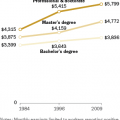 A recent study by the Pew Research Center shows that the cost of not getting a higher education is growing in the United States.
A recent study by the Pew Research Center shows that the cost of not getting a higher education is growing in the United States.
Pew measured results in a number of categories, including job satisfaction, personal earnings and the number of people within each group who have full-time employment.
In almost every measurable category, college graduates are doing better than their non-degree attaining peers, the research found. What’s more, the study found the gap between those who have a degree and do not have a degree is wider than it has ever been in modern history.
Pew conducted a survey of 2,002 adults for the survey and also reviewed economics data from the U.S. Census Bureau.
The research found that college graduates between the ages of 25 and 32 make more each year than those within the same age group with only a high school diploma – about $17,500 annually. Those with a college education are also more likely to have full-time employment (89% vs. 82% for those with only a high school diploma) and are far less likely to be unemployed (3.8% unemployment vs. 12.2% for those with only a high school degree).
Those with college degrees, according to the study, are also more likely to say their job is a career or, at the least, a steppingstone that could lead to a career (86% to 57%). When asked if their position is “just a job to get them by,” 42% of the high school graduates said “yes.” Only 14% of those with a college degree said the same.
In terms of dollars, Pew found that those with a bachelor’s degree or more earned a median salary of $45,500. Those with an associate’s degree earned $30,000, while those with a high school diploma earned $28,000.
That’s a far cry from 1965, when the numbers were $38,833 for those with a bachelor’s degree or more, $33,655 for an associate’s degree and $31,384 for those with only a high school diploma.
Despite these numbers, there has not been a significant increase in the number of Americans with college degrees. While a third of the Millennium generation has a bachelor’s degree, that means 66% of them do not.
In a column on Huffington Post, Brian Mitchell – director of the Edvance Foundation – said that more encouragement needs to be made for all disciplines. He wrote that liberal arts graduates have the communication and analytical skills coveted by corporations, while STEM fields (science, technology, engineering and math) will help lead a rekindling of the American manufacturing industry.





